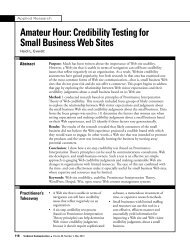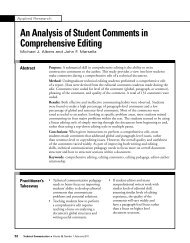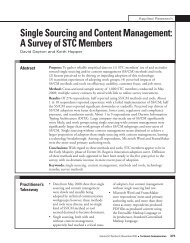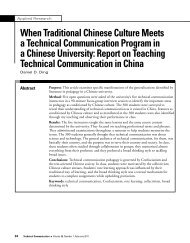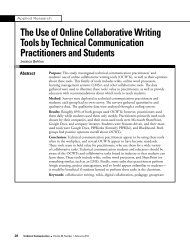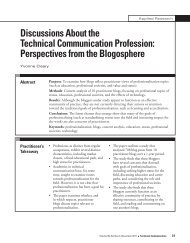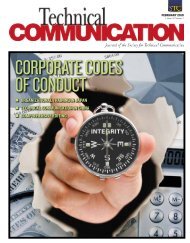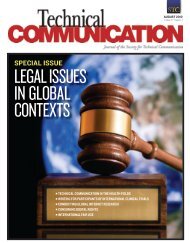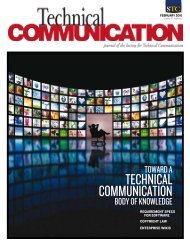SPECIAL ISSUE
Download: November 2011 - Technical Communication - Society for ...
Download: November 2011 - Technical Communication - Society for ...
- No tags were found...
You also want an ePaper? Increase the reach of your titles
YUMPU automatically turns print PDFs into web optimized ePapers that Google loves.
Applied ResearchThe First Wave (1953–1961) of the Professionalization MovementThere has also been some cross-pollination among theU.S. organizations. Several STC fellows are officersor directors of IEEE PCS, ATTW, and CPTSC. Aformer president of STC is now the editor of the IEEETransactions on Professional Communication.As early as 1960, STC discussed the feasibility ofcreating an internal system for accrediting academicprograms (Berry, 1960); more than 50 years later,however, we still do not have an accreditation system inplace. The unsuccessful attempt of IEEE PCS to createsuch a system in the 1990s underscores the difficultyof the task. Although it has been helpful to severalprograms, CPTSC’s Program Review service does notprovide the kind of quality assurance that might comefrom ABET accreditation, for example. Nor was it everintended to do so. Nevertheless, important progress isbeing made in developing and assessing student learningoutcomes in technical communication programs.Scholars have developed a sizable corpus of assessmentliterature in technical communication, and CPTSCnow offers an annual Award for Excellence in ProgramAssessment (CPTSC, 2008b) in connection with theCPTSC Research Assessment Project (Coppola, 2008).One important sign of the discipline’s maturation isthe interest it has shown in the study of ethics in recentdecades. Although organizations such as ATTW (2011)and STC (1998) have codes of ethics to guide membersin their professional practice, we no longer view thesecodes (if we ever did) as sufficient by themselves to fosterethical behavior. We seem to have a better understandingof the motivations and mechanisms behind suchbehavior—if the amount of literature on the subject isany indication. There has been a proliferation in theliterature about ethics in technical communicationscholarship since 1970 (Dombrowski, 2000a, p. 4).Introductory textbooks in technical communicationusually include a section or chapter about ethics.For example, Anderson (2010) integrated “EthicalGuidelines” throughout his textbook. There are severalbooks devoted to ethics in technical communication(Allen & Voss, 1997; Brockmann, 1989; Dombrowski,2000b; Markel, 2001). Undergraduate and graduatecurricula in technical communication often includemodules, if not entire courses, in ethics.Finally, significant progress seems to have been madein the areas of certification and body of knowledge.Recent achievements in these two areas are grounds forbeing optimistic about the profession’s future. STC’simplementation of a certification system for technicalcommunication professionals this year represents theculmination—and in some respects, the achievement—ofmany years of hard work. It may not be all hyperboleto say that “A Monumental Day Dawns for TechnicalCommunicators” (Jong, 2010, p. 6). We will have towatch closely to see whether certification changes theemployment landscape and the public’s perception of theprofession. In the 60 years that have passed since technicalcommunicators created the first professional organizationsand journals in technical communication, the professionhas had time to develop a specialized body of knowledgeand create outlets (e.g., professional conferences andjournals) for documenting, exploring, and critiquing it. Asa framework and portal, STC TCBOK promises to makethat body of knowledge accessible to anyone who wishesto know what technical communication is and whattechnical communicators do.References30-unit graduate curriculum proposed for technicalpublishing master’s degree. (1955, November).Technical Publishing, 1(2), 5. Society for TechnicalCommunication, Fairfax, VA.About the authors. (1959). In S. Mandel (Ed.), Writingin industry: Selected papers from the Proceedings ofConference on Writing and Publication in Industry(pp. 117–121). Brooklyn, NY: Polytechnic Press.ABET information. (2007). IEEE ProfessionalCommunication Society. Retrieved February 9,2011, from http://ewh.ieee.org/soc/pcs/index.php?q=node/56ABET. (2010). History. Retrieved February 10, 2011,from http://www.abet.org/history.shtmlAllen, L., & Voss, D. (1997). Ethics in technicalcommunication. New York: Wiley ComputerPublishing.Anderson, P. V. (2010). Technical communication: Areader-centered approach (7th ed.). Boston, MA:Wadsworth.ATTW. (2011). Code of ethics. Retrieved May 14,2011, from http://www.attw.org/?q=node/107Benjamin, C. G. (1960). Technical writing in thesoaring sixties. In Proceedings of Seventh Annual302 Technical Communication l Volume 58, Number 4, November 2011



